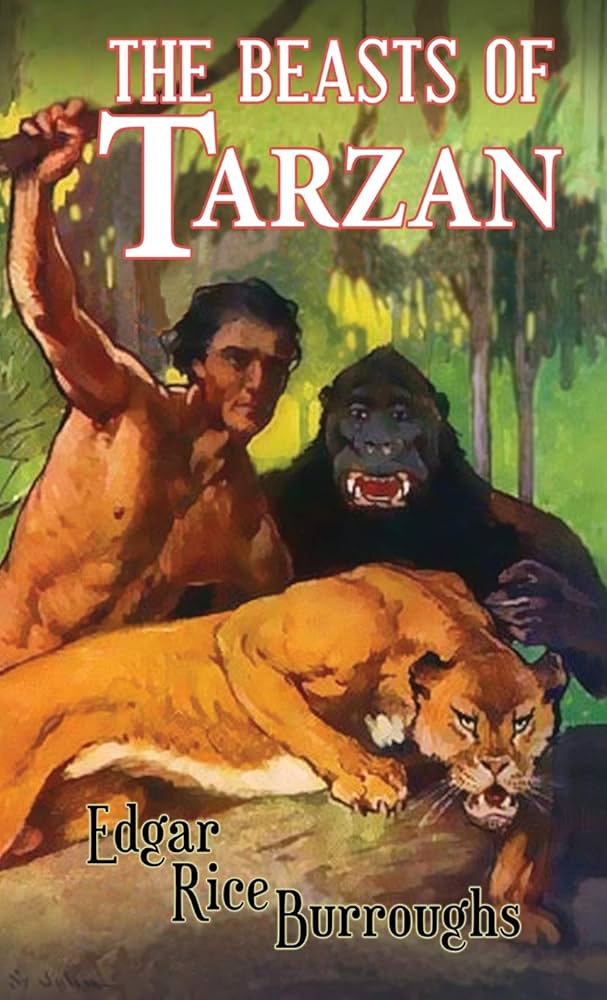Chapter 14 — The beasts of Tarzan
byChapter 14 – The Beasts of Tarzan opens with Tarzan following the slow but determined guidance of Tambudza, an elderly woman whose frail body still carries deep knowledge of the jungle paths. Though slowed by age and chronic aches, Tambudza’s resolve helps guide Tarzan through the underbrush toward the encampment where the Russian adversary, Rokoff, had last been seen. Each step they take feels loaded with urgency as Tarzan grows more anxious over Jane’s fate, uncertain of how far ahead or how much danger she faces. The jungle around them breathes with life, but every distant sound only sharpens Tarzan’s instinct, making the journey feel even longer. Tambudza, despite her limp and weariness, pushes forward, knowing the stakes are high for the man who walks beside her. Her quiet understanding of the terrain offers direction where maps cannot, and her bond with the jungle becomes Tarzan’s path to hope.
At the same time, chaos brews at Rokoff’s camp. Having learned of Tarzan’s approach, Rokoff erupts in a fit of fury upon discovering Jane has vanished. His reaction is not merely frustration but full-blown rage, unleashing verbal attacks and threats on the very men who have traveled with him through this dangerous land. The emotional storm he ignites begins to fracture his tenuous grip over the group. Distrust and fear grow rapidly among his followers, not only toward the jungle but now toward Rokoff himself. As his threats become unpredictable and his violence increases, his men begin to weigh their loyalty against their survival. In a move that seals his fate, some of them abandon him outright, stealing what supplies they can and disappearing into the dense jungle, seeking their own routes back to safety. His camp, once a center of control, falls apart under the weight of his own paranoia and cruelty.
Soon after, Tarzan reaches the abandoned camp. What he finds confirms the chaos: items are strewn about, signs of a quick and panicked exodus are clear, and there is no trace of either Rokoff or Jane. His heart sinks. The trail has grown cold, and his fears begin to harden into grim determination. With little left to do there, he turns back toward the village of M’ganwazam, hoping someone might have seen where Jane went or overheard whispers of her capture. As he moves with urgency, the jungle seems to close in tighter around him, pressing his patience and resolve. In his mind, failure is not an option—each moment matters, and he clings to the belief that Jane is still alive, still out there somewhere waiting for him to find her.
Meanwhile, Jane faces her own test of endurance. Left to her own devices, she survives by recalling the acts of bravery shown to her by those like Anderssen, who sacrificed himself to give her a chance at freedom. Retrieving the hidden rifle he left behind, she arms herself for whatever might come. The jungle, unfamiliar and perilous, demands that she not only stay hidden but also act wisely at every turn. Her strength, previously untested in such conditions, is now emerging, honed by the constant pressure of threat and necessity. As she moves quietly, she witnesses a strange and awe-inspiring moment: an ape, a man, and a panther standing together without conflict. Unknown to her, the man is Tarzan. The harmony of this scene challenges everything she knows about the wild, about fear, and about survival.
Eventually, she finds her way to the river, where a hidden canoe offers the promise of escape. She unties it and prepares to set off, her thoughts racing with the hope of finding safer ground. Just as she is about to depart, Rokoff stumbles into view. No longer the intimidating villain she once feared, he is now desperate, begging to be taken along. Jane, seeing through his cowardice, refuses his pleas. She pushes away from the shore, watching as he is left behind in the growing shadows, no longer a captor, but a broken man left to the jungle’s mercy. That decision reflects her growth—not just in courage but in judgment, recognizing who deserves help and who must face the consequences of their cruelty alone.
The jungle, unpredictable and wild, becomes a reflection of the inner transformations experienced by every character. Tarzan, though wounded by uncertainty, charges forward with an unbreakable will to find the woman he loves. Jane, now far more than a damsel in distress, takes control of her own survival with increasing confidence and clarity. Rokoff, the architect of so much suffering, finally finds himself alone, exposed to the very wilderness he thought he could manipulate. In this chapter, the jungle is not merely a setting—it is a force that tests, reveals, and redefines each individual. From vengeance to resilience, betrayal to redemption, these moments mark the shifting tides of control and character. And as the rivers run and the forest watches, the fates of these lives edge ever closer to their inevitable clash.

